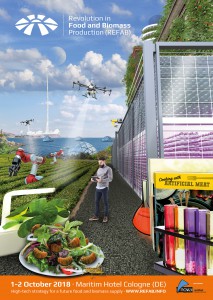Food security is becoming an important issue even in Europe, where this year’s summer drought has led to significant crop failures. How can future food security be guaranteed in times of climate change? Are digitisation, robotization, biostimulants and new possibilities of food production in cities, seas and biotech laboratories medium and long-term solutions?
Deutsche Fassung: https://renewable-carbon.eu/news/ernteausfaelle-durch-trockenheit-bahnbrechende-innovationen-in-der-lebensmittelproduktion-in-sicht/
The consequences of climate change require a fundamental restructuring of our food production and farmers worldwide are searching for alternatives to protect their yields from the impacts. The enduring drought in Europe draws attention to the need for comprehensive changes and alternatives.
The digitalisation of agriculture, including various technologies for precision farming, artificial intelligence (AI), robots and drones, holds the promise to make modern agriculture more efficient, more sustainable and less susceptible. Comprehensive information on the climate, local weather or soils leads to profound decisions on plant selection, sowing, fertilisation, crop protection and harvesting. The new technologies will not only make food and biomass production more ecological and safer, but will also improve the ecological footprint of animal husbandry. Or, to put it in a nutshell: Less input, more output and lower environmental footprint.
Additionally, organic farming and smallholder farmers will also benefit from these high-tech strategies, develop new concepts and still be able to adhere to their ideals. Drones and robots make crop protection without chemicals easier and more efficient, and biostimulants can target-specifically regenerate soil quality.
At the same time, latest plant breeding technologies enable an optimal adaptation of plants to local conditions, and promise higher nutrient contents as well as an improved photosynthesis.

The multitude of, today or in the near future, market-ready technologies will be presented and discussed for the first time at the international conference “Revolution in Food and Biomass Production (REFAB)” (www.refab.info) on October 1 and 2 in Cologne, Germany. With the summer drought, the topics of the 50 speakers are more appropriate than ever in Europe.Important changes are also expected in food production in cities, seas and biotech laboratories. Vertical agriculture in cities produces food close to the consumer and can thus deliver fresh. At the same time, the productivity per area can be up to 300 times higher compared to traditional agriculture. First commercial implementations of vertical farms show how highly automated and closed circuits can reduce water consumption by 90 percent, completely eliminate the use of pesticides, and even increase the nutrient content through lighting of plants optimised by LEDs. Urban agriculture brings the production of high-quality vegetables to consumers in the cities, regardless of weather conditions.
New technologies can also open up new areas for food production, whether under water – aquaculture for fish and algae – or in the desert. At the conference, scientists from Africa will for example show how surfaces in the Sahara can be successfully used for food production.
Another important question is how to reduce dependence on animal protein sources. Insects, algae and the direct use of CO2, with the help of bacteria, open up new protein sources, which considerably save resources and greenhouse gas emissions compared to classic meat production. At the REFAB conference, the Future Protein Award will be handed out, and already seven candidates have applied with very different concepts. Further candidates are welcome, the registration deadline is end of August (www.refab.info/future-protein-award/).
How can these cross-pollinating sectors and actors develop solutions towards systemic change and how sustainable are these solutions in comparison to conventional agriculture? Answers to these questions will be given at the conference Revolution in Food and Biomass Production (REFAB), October 1 and 2 in Cologne (Germany). Leading global players will demonstrate how the agriculture of the future could look like by presenting their innovative technologies, existing alternatives and visions for the future of food production. Major companies, such as BASF, Borregaard, Claas, DSM, Evonik, Lenzing, Microsoft, Osram and Tata, dozens of innovative SMEs and start-ups as well as leading research institutes and the European Commission are part of the agricultural revolution that is presented at the REFAB conference.
Already 120 participants from 20 countries are registered, and up to 500 participants are expected to join the conference and exhibition.
Dr. Bronner’s (US) and BIOCOM AG (DE) are bronze sponsors of the conference. The Fachagentur für Nachwachsende Rohstoffe e.V., (FNR, (DE)) supports the event as premium partner.
More press releases with visual materials and background information on the mentioned topics can be found at www.refab.info/press
Source
nova-Institut GmbH, press release, 2018-08-16.
Supplier
BASF SE
BIOCOM Interrelations GmbH
Borregaard
CLAAS Gruppe
Dr. Bronner's Magic Soaps
DSM
Evonik Industries AG
Fachagentur Nachwachsende Rohstoffe e.V. (FNR)
Lenzing Gruppe
Microsoft
nova-Institut GmbH
OSRAM GmbH
Tata Consultancy Services Ltd (TCS)
Share
Renewable Carbon News – Daily Newsletter
Subscribe to our daily email newsletter – the world's leading newsletter on renewable materials and chemicals










